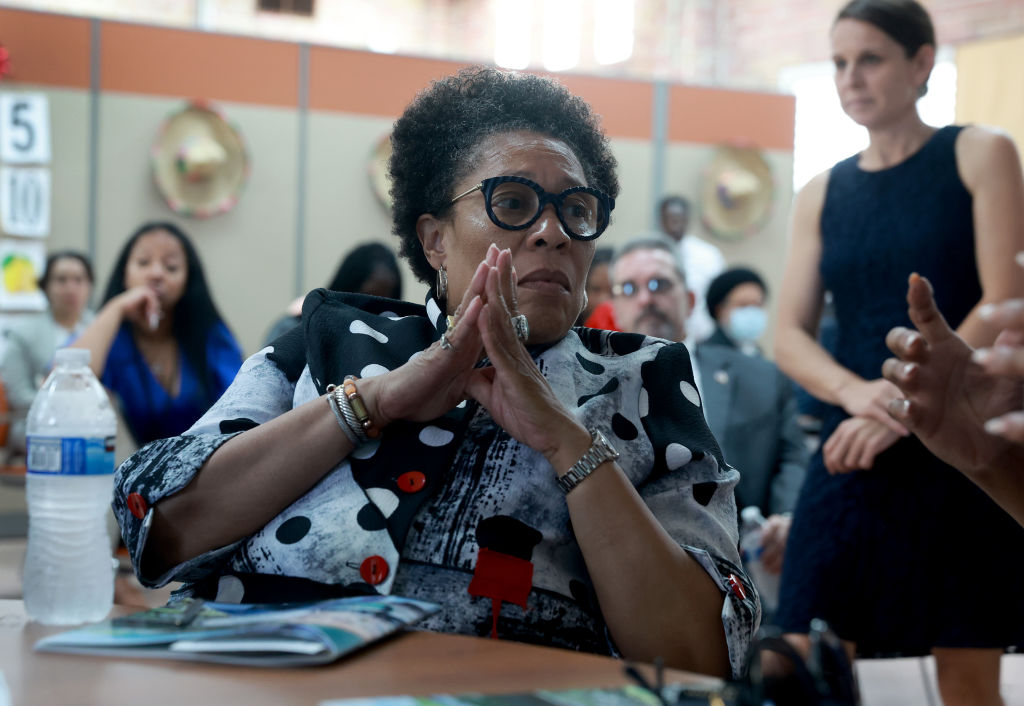HUD Unveils Wealth Building Initiative For Low-Income Families
HUD Secretary Marcia Fudge attends a meeting in Miami, FL, to address key resilience infrastructure projects. Source: Joe Raedle / Getty
The U.S. Department of Housing and Urban Development (HUD) has released a plan to help low-income renters build equity and ownership. On Aug. 4, the department unveiled its Bridging the Wealth Gap initiative, which will allocate $113 million in funds to help low-income families increase their earned income and improve financial stability.
According to a press release, HUD’s new agenda focuses on “asset building through increased savings, access to mainstream banking, and credit score improvement.” The department believes economic stability can be achievable for millions of Americans by integrating these asset-building tools.
HUD Secretary Marcia L. Fudge went into detail about the program during a recent interview with Axios.
“With Bridging the Wealth Gap and this historic funding opportunity, we’re trying to make sure that every single person in this country can get their piece of the American dream,” she said. “We’re looking at everything through a lens of equity and how we address systemic racism. We’re giving people who have historically been left out and underserved the resources to take a chance on their futures – to improve their credit, save resources for homeownership and other needs, and build wealth. That’s what this is all about.”
American families are having a hard time saving
The U.S. Department of Housing and Urban Development’s new wealth-building initiative will be an expansion of its Family Self-Sufficiency program, which currently serves around 65,000 participants at over 700 Public Housing Authorities. FSS is a voluntary program that uses a combination of coordination of services and supports from community partners and an escrow savings account to help participants grow their earned income and savings. In 2021, the average family was able to save around $9,500 after participating in the program.
Millions of Americans are struggling to save due to soaring rental, and life necessity costs over the years. A report published by Redfin in June found that apartment rentals climbed in 2022. The average monthly rent in May was above $2000 across the U.S. That’s a 15 percent increase from where it was last year, according to the analysis.
In 2021, the median cash savings for renter households was $1,400 compared to homeowner cash savings of $10,100. HUD’s Building the Wealth Gap plan will work to combat the issue by increasing federal rental assistance and helping families work towards homeownership through vital homebuying programs.
Credit is an essential part of the wealth-building puzzle for millions of low-income families, but what happens if you’re credit invisible? A study conducted by the Consumer Protection Financial Bureau, found that nearly 26 million Americans fell under the category. The study attributed the cause to people failing to report their credit history to the nation’s top agencies, including Equifax, TransUnion, and Experian.
CFPB Director Richard Cordray once remarked that “some of the most economically vulnerable” consumers are more likely to be credit invisible.
“A limited credit history can create real barriers for consumers looking to access the credit that is often so essential to meaningful opportunity—to get an education, start a business, or buy a house,” Cordray said.
SEE ALSO:
HBCU Alum Becomes First Black Juvenile Court Judge In Memphis
TSU Offers Students Online Classes Amid Growing HBCU Housing Crisis
Herschel Walker Finally Agrees To Face Off With Sen. Raphael Warnock In A Debate
The post HUD Unveils Wealth Building Initiative For Low-Income Families appeared first on NewsOne.

